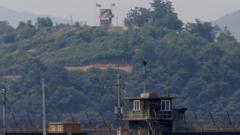As the Western media faces limitations, Russian state-backed outlets like RT and Sputnik are strategically expanding their reach across nations in Africa, Latin America, and the Middle East, navigating cultural sentiments and exploiting gaps left by diminishing local news coverage.
### Russia's Strategic Media Expansion: Beyond Western Eyes

### Russia's Strategic Media Expansion: Beyond Western Eyes
*Exploring how Russian state-backed media is increasing its global presence while bypassing Western restrictions.*
In recent years, Russian state-backed media have methodically increased their presence around the world, particularly in regions traditionally less influenced by Western narratives. This extension comes on the heels of significant sanctions and bans imposed by the US, UK, Canada, and the EU against outlets like RT and Sputnik following Russia's military actions in Ukraine. Yet, as these Western nations tighten their grip, Russian outlets are seizing the opportunity to fill the void, promoting their narratives in countries where anti-Western sentiments run deep.
Javier Gallardo, a truck driver from Chile, recently encountered RT while switching on his television. Instead of the usual classical music programming, he was greeted with war coverage he could not relate to, leaving him puzzled as he discovered the channel's Russian origins. In Chile, RT has reportedly taken over broadcasts from Telecanal, prompting local regulatory scrutiny.
Over the past three years, RT has expanded its international footprint, launching operations in various countries, including Algeria and Serbia, and announcing plans for a bureau in India. Sputnik, its sister outlet, has ventured into Ethiopia, marking its intent to cater to important geopolitical regions where Western media has retracted or downsized. This reflects a trend where Russian propaganda exploits unfulfilled information needs in vulnerable markets.
"Russia is like water: where there are cracks in the cement, it trickles in," notes Dr. Kathryn Stoner, a political scientist. The diverse motivations of audiences outside the West, including skepticism towards imperialism and recent American foreign policy, create a fertile ground for Russian narratives to take root. Such areas, previously graced by Western media dominance, are now witnessing a rise in Russian influence partly due to diminished resources and an unwillingness to engage deeply with local contexts.
The expansion of RT in Africa has been particularly pronounced; with a reported seven bureaux across the continent, RT is adapting its messaging to resonate with audiences steeped in historical anti-colonial sentiments. By offering reliable news coverage and opportunities for training local journalists, RT aims to establish itself as a credible news source rather than a mere propaganda machine.
Research indicates that many global audiences, while acknowledging some bias in RT's reporting, still perceive it as a legitimate alternative to mainstream media. Observations from UK viewers reveal a belief that they possess the analytical tools to differentiate factual reporting from misinformation, although this confidence might not protect them against subtle narrative manipulations.
This raises questions regarding Russia's ultimate goals in expanding its media reach. Analysts suggest that Moscow seeks to reshape perceptions of its global stance, presenting itself as a victim of Western aggression and a defender of the Global South. The narrative surrounding NATO's expansion, framed as a security threat justifying Russia's maneuvers, resonates particularly well in regions still wrestling with the remnants of colonialism and Western hegemony.
RT's educational initiatives aimed at local journalists further underscore this strategy, as they disseminate a belief in a media landscape free from bias—even as RT's own editorial practices come under scrutiny for misleading portrayals of events like the conflict in Ukraine and accusations of war crimes.
Despite being barred from platforms such as YouTube globally, Russian narratives infiltrate digital spaces through alternative avenues, such as local YouTube creators who share content from RT. This grassroots distribution expands their reach and impact, making it difficult to contain or regulate.
Prof. Stephen Hutchings warns that the West's neglect to fund and support robust international journalism is creating a vacuum into which Russian state media is stepping boldly. With ongoing budget cuts to services like Voice of America and closures of foreign branches, the narrative landscape risks tilting unfavorably, allowing disinformation to flourish.
Concerns grow surrounding the influence of Russian media in reshaping public opinion and reinforcing authoritarian regimes in unstable regions. The Kremlin's aim, according to experts, is to shift the global balance of power by nurturing allies and leveraging both ideological sympathy and tangible support.
As the stakes rise, the potential ramifications of Russian media expansion highlight the delicate state of global democratic values. With influential narratives at play, the fight for information supremacy may become as critical as the battles fought on physical terrains, making it vital for democratic nations to reassess their approach to global media strategies.



















